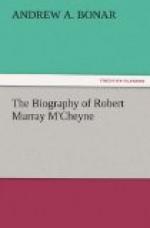[10] The first text
he gave to be thus hidden in the heart was
Isaiah 34:15; “Until
the Spirit be poured out from on high.”
A specimen of the happy freedom and familiar illustrations which his people felt to be peculiar to these meetings, may be found in the notes taken by one of his hearers, of Expositions of the Epistles to the Seven Churches, given during the year 1838. He had himself great delight in the Thursday evening meetings. “They will doubtless be remembered in eternity with songs of praise,” said he, on one occasion; and at another time, observing the tender frame of a soul which was often manifested at these seasons, he said, “There is a stillness to the last word,—not as on Sabbaths, a rushing down at the end of the prayer, as if glad to get out of God’s presence.” So many believing and so many inquiring souls used to attend, and so few of the worldlings, that you seemed to breathe the atmosphere of heaven.
But it was his Sabbath-day’s services that brought multitudes together, and were soon felt throughout the town. He was ever so ready to assist his brethren so much engaged in every good work, and latterly so often interrupted by inquiries, that it might be thought he had no time for careful preparation, and might be excused for the absence of it. But, in truth, he never preached without careful attention bestowed on his subject. He might, indeed, have little time—often the hours of a Saturday was all the time he could obtain,—but his daily study of the Scriptures stored his mind, and formed a continual preparation. Much of his Sabbath services was a drawing out of what he had carried in during busy days of the week.
His voice was remarkably clear,—his manner attractive by its mild dignity. His form itself drew the eye.[11] He spoke from the pulpit as one earnestly occupied with the souls before him. He made them feel sympathy with what he spoke, for his own eye and heart were on them. He was, at the same time, able to bring out illustrations at once simple and felicitous, often with poetic skill and elegance. He wished to use Saxon words, for the sake of being understood by the most illiterate in his audience. And while his style was singularly clear, this clearness itself was so much the consequence of his being able thoroughly to analyse and explain his subject, that all his hearers alike reaped the benefit.




